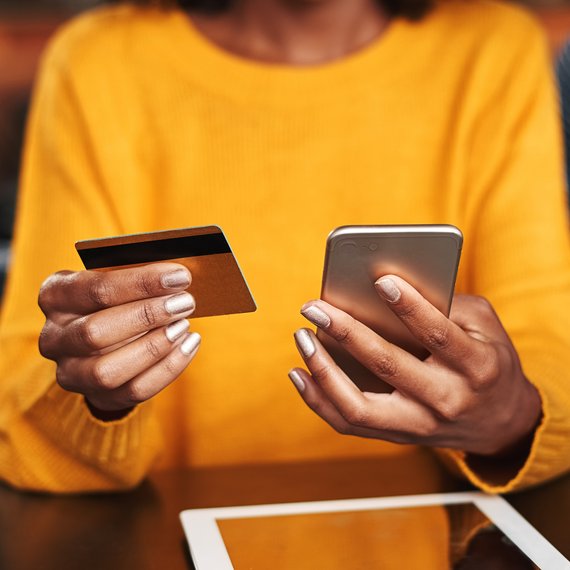
- Five minutes read
Digital payments in the community
How digital wallets can support people to make payments or send money to family and friends in a crisis.
As the battle to contain the spread of COVID-19 continues, many people across the globe are being advised or directed to self-isolate or take a step back from society and stay at home for weeks, or even months.
One silver lining is how it is bringing communities together as they rally around to support vulnerable people or those in need, including by volunteering to buy provisions from stores such as medication or groceries.
However, one question that needs to be addressed is how payments can facilitate this temporary ‘new normal’. Naturally people in isolation will want to give money to those buying their groceries or repay a person who has bought provisions on their behalf, but how will they do it?
The increased reliance on person-to-person (P2P) payments as a key component in regular commerce will be one of the most significant trends impacting payments in the coming months, especially as many of the traditional payment methods consumers have used previously suddenly appear unfit for purpose.
Cash concerns
In the first instance there appears to be a simple solution to the issue of how to give money to someone or repay them if they have bought something on your behalf.
When we asked consumers last year how they’d repay a friend that they owed money to, 78% said that they would repay £10 (or the equivalent) with cash, and 66% said they would pay £25 (or the equivalent) with cash.
However, access to cash may now be restricted. In many countries globally the government’s measures to combat COVID-19 include a restriction on movement for all or a subsection of citizens; this has an impact on the usability of cash as a payment method between people. Many countries have reported that some citizens are withdrawing large volumes of cash, potentially because they are concerned that their access to cash will be restricted for a significant period of time.
Where some consumers haven’t done this but are still committed to using cash despite being restricted in their travel, a door has been opened for criminality. News reports are suggesting that, among other tactics, fraudsters have been convincing vulnerable people or those that are self-isolating but desperate to access cash to hand over bank cards and reveal pin numbers on the promise to withdraw money at an ATM on their behalf.
Even where consumers do have the cash available, there appears to be a reluctance to use it due to concerns cash might be a transmitter of the virus. In many stores across the globe there’s a growing unwillingness to accept cash payments in the short term, and some have banned cash altogether.
In actual fact the World Health Organisation (WHO) has refuted the report that it had issued an official warning against using cash, instead advising consumers to wash their hands thoroughly after handling cash. But it may still be the case that both a sender a recipient opt against spreading more cash into the community due to health risk concerns.
Keeping bank details secure
A second option to consider might be a direct bank transfer. This payment method tackles come of the issues presented by cash; being digital it is both universally accessible to anyone with an internet connection and an online bank account, and also doesn’t compromise social distancing rules or involve the physical exchange of fiat currency.
However, this payment method does rely on the recipient’s willingness to share their financial details with the sender. And while it may be palatable for some to share these with family and friends, it is unlikely that there is the same level of eagerness to do so with a wider social network or the community at large.
Again, the escalated threat of fraudsters targeting people in uncertain times means that a blanket rule of refusing to share any of your financial data with anyone is undoubtedly the most secure and appropriate course of action.
The benefits of both worlds
A solution that marries the security and privacy of cash with the accessibility and contact-free nature of bank transfers is digital wallets. Using a digital wallet service, consumers can send money to each other, either as a form of repayment, a gift sent remotely where travel restrictions are keeping friends or family apart, or simply to offer financial support to those in need, without having a physical connection in-person or through currency. It also doesn’t rely on sharing financial details; in many cases, such as when using Skrill, only the recipients email address is required to make a transfer.
Traditionally digital wallets have been used by consumers in some countries such as the UK mainly to buy products and services securely and efficiently from online businesses, but in others adoption of digital wallets as a P2P payment method have been much stronger.
With perhaps the exception of China, the US leads the rest of the world in P2P payment adoption. When asked last year, 14% of US consumers said that they would repay a £10 to a friend using a P2P app such as a digital wallet, a significantly higher percentage than consumers in countries such as Germany (7%) and the UK (5%).
But with a number of strong use cases during this period of economic and social flux surrounding the COVID-19 outbreak, it may be the case that we see a significant shift of the dial when it comes to the adoption of digital wallets for P2P payments in more countries. For many consumers looking for a solution to specific payment problems for the first time, turning to digital wallets may provide the answers.




